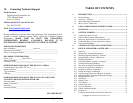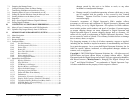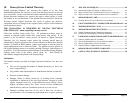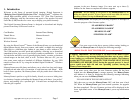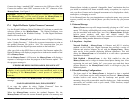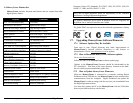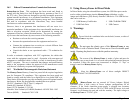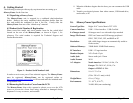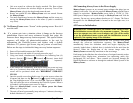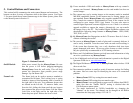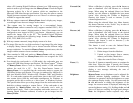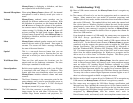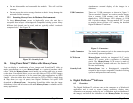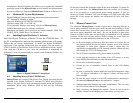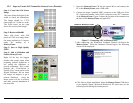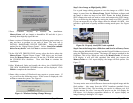
Copyright© 2006 Digital Spectrum Solutions, Inc. Page 54
Connect the larger “standard USB” connector to the USB port of the PC.
Connect the smaller “mini-USB” connector to the “PC” connector of the
MemoryFrame. See Figure 3.
Important! For the PC application (Digital PixMaster) to communicate
to the MemoryFrame, you first need to prepare the MemoryFrame for
communicating to a PC by putting into Slideshow display mode.
17.4 Digital PixMaster Update Firmware Command
Use the Digital PixMaster (Digital PixMaster)™ software to transfer the
software update to the MemoryFrame. The Digital PixMaster icon
should be located on the Windows Desktop. To start Digital PixMaster
double-click on the icon.
Next, from the “MemoryFrame” pull-down menu of Digital PixMaster,
select “Update Firmware.” Follow the on-screen instructions to point to
the updated firmware file (with a “.bin” file extension) that you just
downloaded from the Digital Spectrum website to the hard-drive.
After you click on the OPEN box to select the .bin firmware update file,
Digital PixMaster will display a progress bar to indicate the transfer of the
file to MemoryFrame.
On the MemoryFrame’s LCD screen, the MemoryFrame will display a
sequence of messages to show the progress of the firmware update. The
first progress message is:
“FIRMWARE BEING DOWNLOADED, PLEASE WAIT”
Important! When the progress bar shown in Digital PixMaster is
complete, it only signifies that the file has been transferred, and it is just
the beginning of the MemoryFrame’s actual process of updating its
firmware.
If a transfer error occurs, the MemoryFrame will display the following
message:
“BAD FLASH DOWNLOAD, PLEASE RETRY”
If so, retry the update by select “Update Firmware” from the
“MemoryFrame” pull-down menu of Digital PixMaster.
When the MemoryFrame receives the updated firmware file, the
MemoryFrame will erase the current firmware portion of its memory and
Copyright© 2006 Digital Spectrum Solutions, Inc. Page 2
MemoryFrame includes a patented “changeable frame” mechanism that lets
you install a standard 8x10 frame available nearly everywhere, in a style to
suit your décor. Frames can be changed in moments to be displayed on a desk,
mantelpiece, or hanging on a wall.
So let MemoryFrame free your imagination to explore the many ways you can
express yourself, not only with the photos you take, but the way you present
them.
1.1 Internal Storage
MemoryFrame stores up to 80 images internally, playing on a 10.4” active
matrix TFT display at 800x600 pixel screen resolution. Stored images can
also be associated with audio clips (.wav files). MemoryFrame includes
built-in stereo speakers, with mute and volume control. The
MemoryFrame also includes Audio Out connector for external speaker
connection, adding another dimension of impact.
1.2 Anywhere - Anytime
Network Enabled - MemoryFrame is Ethernet and 802.11 wireless
enabled via the USB port. Digital Spectrum has certified a variety of
Ethernet and wireless adapters for use with the MemoryFrame. Many
units can be in the network displaying different slideshows. This also
allows the MemoryFrame to be mounted in a wall when a permanent
installation is desired.
Web Enabled - MemoryFrame is also Web enabled so that the
MemoryFrame can be a target in internet based photo sharing sites. After
registering the unit and “buddy list”, your guests can send their latest
pictures directly to the MemoryFrame where it will begin to play the
additional photos.
1.3 Broad Mounting Configurations
The front panel of the MemoryFrame is designed so that a standard
8”x10” wood frame can be easily mounted and secured. MemoryFrame
includes built-in wall mount slots for landscape and portrait wall
mounting, along with a removable stand for desktop use.. Other mounting
accessories are available such as pole stands, VESA brackets, unique
decorative frames, etc.



